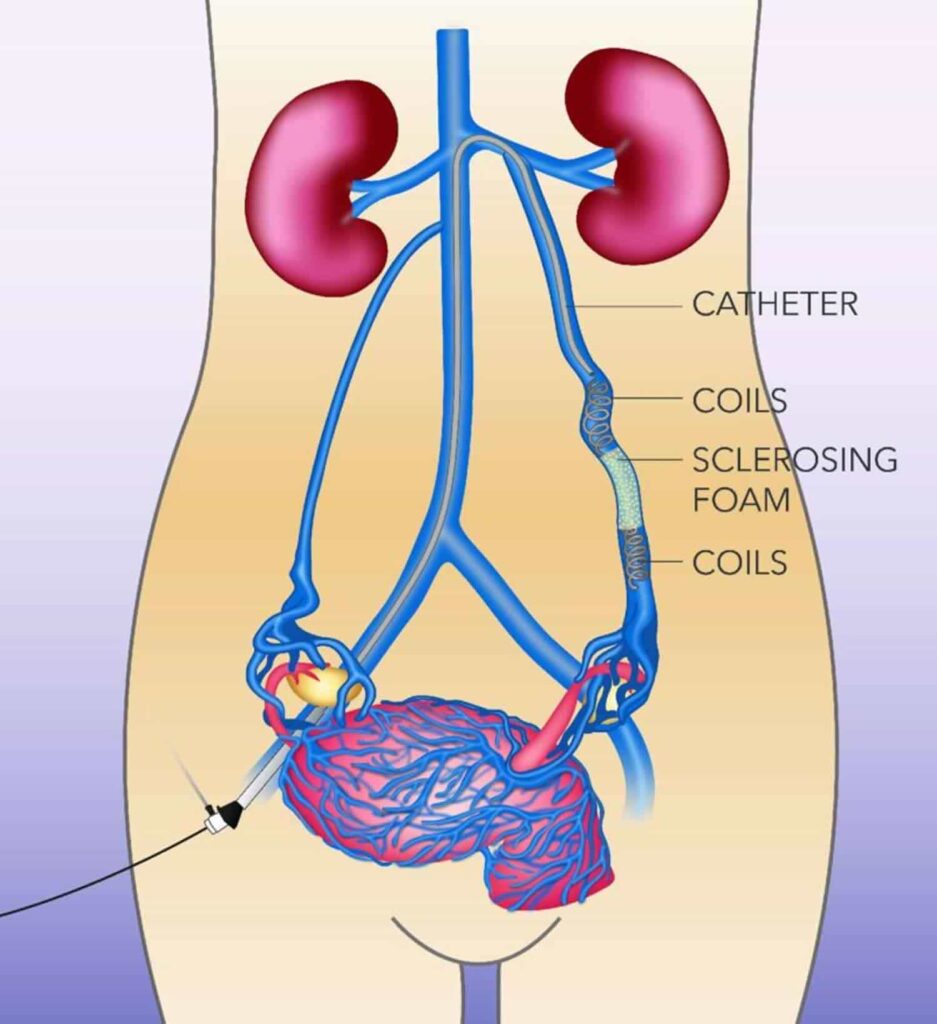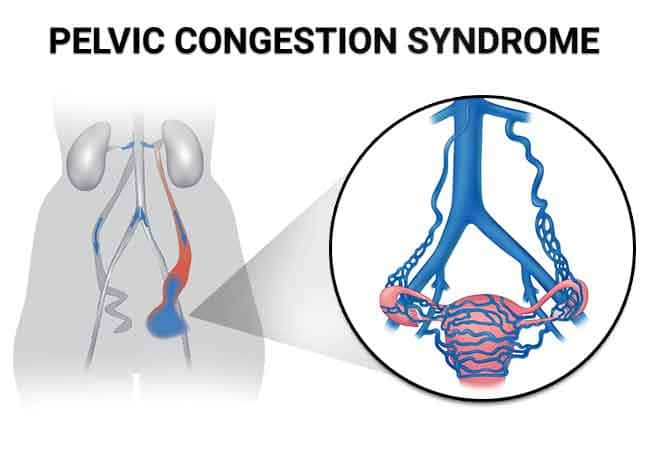WHAT IS PELVIC CONGESTION SYNDROME ?
Pelvic congestion syndrome (PCS) is a chronic condition that happens when varicose veins form below the abdomen within the pelvic region. Varicose veins are veins that get swollen, twisted, and lengthened as a result of poor vein function.
The syndrome usually causes constant dull pain in the pelvic area that is said to worsen at different times and in varying situations. It is more likely to develop in people who have previously given birth.
Experts believe it could be the source of pain in up to thirty percent of people who have chronic pelvic pain.
WHAT ARE THE SYMPTOMS OF PCS ?
People with PCS generally report that the dull pain is chronic but that it worsens in specific situations, including :
- After standing up for a long time
- In the days leading up to menstruation
- In the evenings
- During and after sexual intercourse
- In the late stages of pregnancy
Besides the pain, people might experience other PCS symptoms as well as different combinations of these symptoms. The severity could also vary quite widely between individuals. These symptoms could include :
- Dysmenorrhea (painful menstruation)
- Abnormal bleeding during menstruation
- Backache
- Depression
- Fatigue
- Varicose veins around the vulva, bottom, and legs
- Abnormal vaginal discharge
- Swelling of the vagina or vulva
- Tenderness of the abdomen
- Increased urination
- Irritable bowel symptoms
- Hip pain
WHAT CAUSES PCS ?
Pregnancy is presently thought to be the most common cause of PCS. There are many reasons why pregnancy may bring this condition :
- Pregnancy could cause structural alterations in the pelvis. These changes could affect some blood vessels, and that increases the risk of developing varicosities.
- Another reason is that the body generally gains fluid and weight to support the baby. Sometimes the veins cannot cope with the volume of fluid. They then become engorged to the extent that the valves are damaged and blood could then flow back through them, which causes them to become varicose.
- A reason pregnancy is thought to cause PCS is because the increase in estrogen weakens the blood vessel walls.
WHAT ARE THE RISK FACTORS FOR PCS ?
While pregnancy is the primary risk factor for anyone, there are other risk factors for developing PCS. These risk factors include :
- More than one pregnancy
- Hormonal changes
- Having a “tipped” or retroverted uterus
- Polycystic ovaries
- Extra weight in the legs
HOW IS PCS DIAGNOSED ?
PCS could be quite difficult to diagnose, and doctors often need to carry out multiple diagnostic procedures to eliminate other potential causes for your symptoms. These procedures could include :
- Ultrasound
- Laparoscopy (a surgical procedure that uses tiny cameras to look inside the pelvis)
- CT scan
- MRI scan
- Venogram
The ultrasound is usually preferred as the first step in diagnosing PCS as it is possible to detect the varicosities as well as assess the blood flow.
WHAT ARE THE TREATMENT OPTIONS FOR PCS ?
Treatment for PCS is generally aimed at reducing and alleviating symptoms. There is no definite cure for the condition, and it could be challenging to treat.
Medications available to help relieve your symptoms could include :
- Nonsteroidal anti-inflammatory drugs (NSAIDs)
- Chronic pain medications (like gabapentin plus amitriptyline)
Currently, the most successful treatment is a minimally invasive surgical procedure known as pelvic vein embolization (PVE). This procedure blocks off specific varicose veins that are believed to be the source of pain.
Studies have shown a significant improvement in symptoms in people who have had PVE. As with any procedure, there are risks, and this treatment option might not be appropriate for everyone.
PCS IN PREGNANCY
The symptoms of PCS usually get worse in the late stages of pregnancy as the baby gets bigger and heavier. Additional pressure is put on the varicose veins in the pelvis, which often results in an intensification of the pain caused by the condition.
WHAT’S THE OUTLOOK FOR PEOPLE WITH PCS ?
PCS is not a condition that affects your life expectancy, but it does have the potential to significantly affect your quality of life.
Symptoms such as chronic pain, pain during sexual intercourse, and dysmenorrhea can lead to a decrease in physical activity, loss of function, and depression.
A diagnosis does not necessarily mean you will be affected to this extent — PCS varies greatly in terms of severity.
Keep in mind that there are treatments available to minimize your symptoms and help you deal with this condition. Speak with your doctor about your options.
It is also important to talk with your doctor about counseling, if needed, to help you cope with the significant chronic pain that could go along with having PCS.
If you or anyone you know is suffering from pelvic congestion syndrome, our expert providers at Specialty Care Clinics will take care of your health and help you recover.
Call 469-545-9983 to book a telehealth appointment for an at-home check-up.




